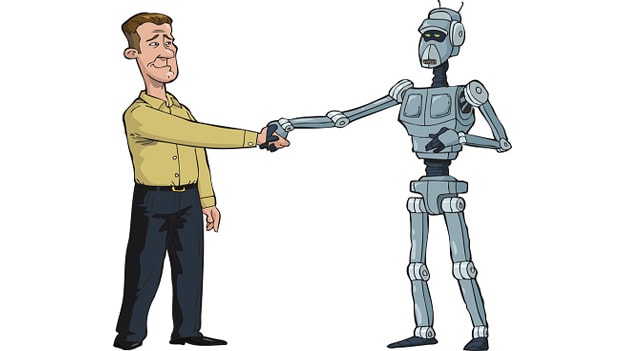Employees not averse to the idea of robots as colleagues: Survey

A study undertaken by Jobsite (UK) has unearthed interesting insights regarding how present day employees view working with employees of the future – the robots. In times when concepts like automation and artificial intelligence get equal, if not more, attention than employee retention and employee engagement, the findings of the study make for an interesting reading. The following are the highlights of the same:
- Nearly 75% of the respondents of the study were ‘perfectly happy’ to have robots as colleagues, and the top three jobs that everyone wanted outsourced to machines are customer billing, cyber security, and administration.
- Over half the employees who participated in the survey said that the robots can work on cumbersome and routine work, and make their own work more interesting; and two-thirds were of the view that robots can help them get more work done.
- 33% of the respondents were worried that their job might be at risk, whereas 37% admitted that they were concerned if their skills would be rendered obsolete when the participation of machines increases.
The results talk about automation and robots in a wider context, and also include how employees would feel about robots working alongside them as colleagues, as opposed to only robots taking over jobs. While there is no doubt that several present-day job profiles and skills will be rendered redundant in the future, for robots to replace humans in entirety seems like a far-fetched reality, the study notes. In the short-term, automation will be applied to routine, repetitive and boring aspects of one’s job, so that one can really focus on adding value to the work and to the organisation. However, in the event that automation fares well at this step, there is a good chance that a majority of employees in white-collar jobs could be replaced by machines. In such a scenario, being an expert in your domain will no longer be a choice, and employees will have to really update and build their knowledge and skills to be able to specialise in what they do best.
Recent reports of Bill Gates advocating for machines to pay taxes for the work they do has many dreaming about a scenario which might just deal with the massive human unemployment that automation is likely to bring with itself. What is guaranteed is the fact that, not just work but human society on the whole, is on the cusp of a radical transformation. How we behave, work, act, and live our lives, and traditional notions society, economy and politics are all about to witness a rather drastic change in the coming years.
Jobsite CEO Nick Gold summarises it in the best manner, “In a job market riddled with skill shortages, workers should be embracing automation, as businesses use advances in technology to bridge the skills gap. This technology is a powerful tool to create efficiencies but, like other technologies have done before, new opportunities and jobs will be created in its wake... it would seem that job losses are a way off. As such, candidates should not be discouraged. Whether you're a fan or a critic, one thing is clear – automation is here to stay and is only going to become more accessible."










